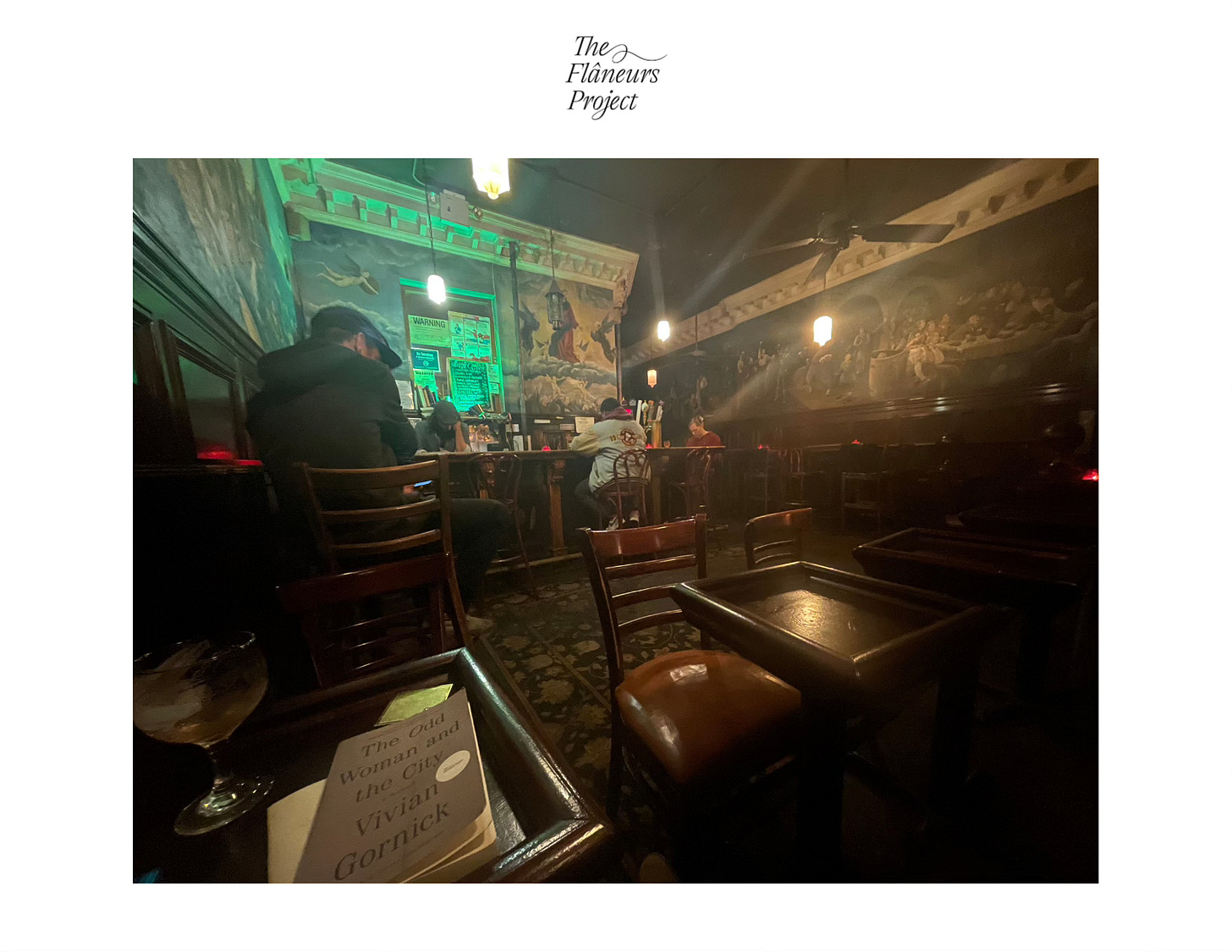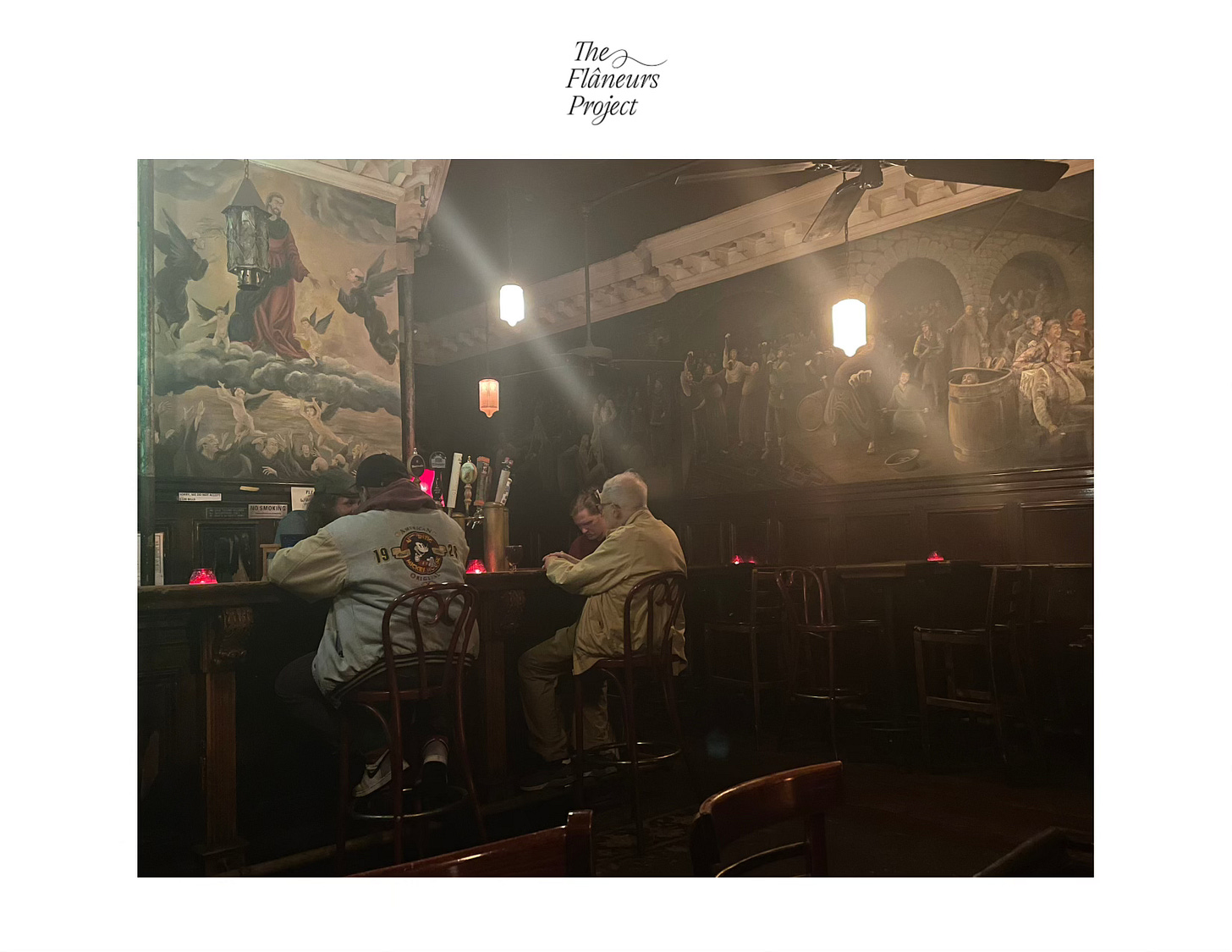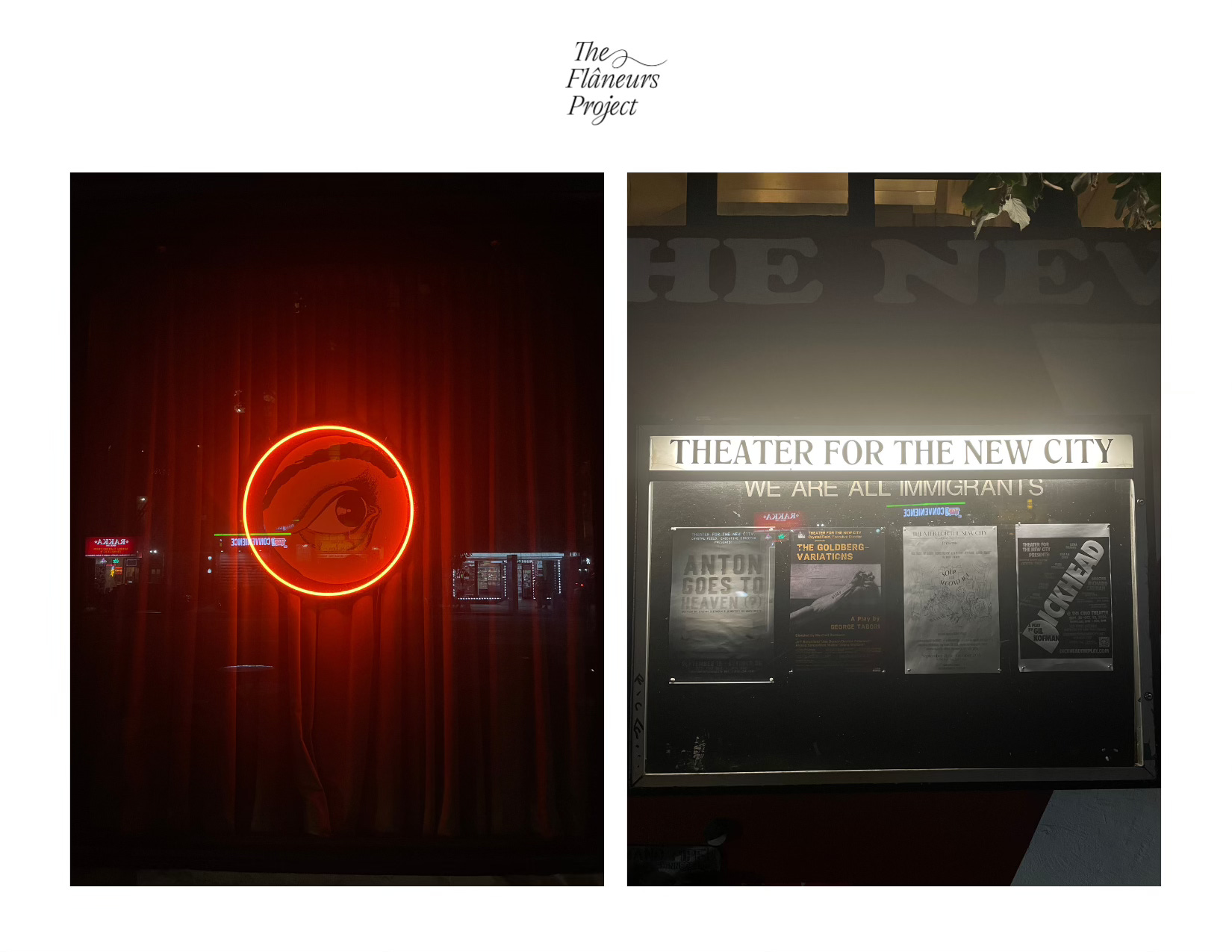Notes On Leaving
Quick Field Notes From New York: Part Two
Welcome to The Flâneurs Project. In my previous essay, Quick Field Notes From New York: Part One, I shared a few stories and notes from my first three days visiting the United States for the first time. This essay continues that exploration, focusing on my final days in the city and why I chose to leave early, despite having long desired to experience this city.
A bar in East Village, Manhattan
It’s a warm, quiet Sunday night in October, and I’m in East Village, Manhattan, at a bar that shall not be named. I’m exhausted, having walked 25 kilometers through the city today, and I think I’m feeling the first signs of the flu. I hope it’s just travel fatigue—I’ve been in and out of planes all week—so I stop to rest at a place my friend Jonathan brought me to just the night before: a bar that plays Gregorian chants, where the bartender shushes people if they speak above a whisper. Someone left a review online that said: “Nothing changes here. If it ever does, it will be time to leave.”
I arrive around 8 PM, and the place is empty, with soft classical music playing in the background—a contrast to the Gregorian chants I heard last time. Slowly, I approach the bar, order a glass of apple cider, and take my book out of my bag. I choose a cozy nook in the corner, near the wall, as a place to rest for a few hours. I remember the lighting being warmer the last time I was here, just yesterday, and indeed it feels brighter and less intimate now—perhaps because there’s someone else behind the bar.
More guests arrive, quietly approaching the bar to order their drinks before settling into their seats, eyes fixed on their phones. It’s so quiet—nobody speaks. Normally, I’d be pleased by this silence, as I love reading in peaceful places, but tonight the stillness frustrates me. There’s a palpable division between the guests, and it feels uncomfortable. The bartender is the type who clearly doesn’t want to be there—it shows, despite his politeness and friendliness. In a quiet place like this, it’s easier to notice all the other, subtler ways people speak.
The man who returns
The silence is shattered by an older man who arrives, and I recognize him immediately—he was here last night at the same spot at the bar. There was something special about him, even though he didn’t speak that night.
This time, he breaks the silence, trying to engage with the bartender after ordering his drink: a framboise, a beer with a berry flavor. He asks questions, curious and very much alive, and my frustration with the earlier silence dissolves into the air. There’s something comforting about this conversation between strangers and about men like him who are eager to keep asking questions.
“How many nights are you working here?” he asks the bartender. “Only one night per week,” he replies. We later learn that the bartender teaches fiction classes on the other days.
“Is this a framboise? Delicious. Many calories,” the older man remarks.
I stand up and order one as well, even though I do not like beer.
The older man shares that he has started to enjoy Thomas Wolfe’s books and wonders if the bartender has read anything by him. My ears perk up, and at this point, I’m taking serious notes. I know I will leave New York with one of Wolfe’s books.
“Last round: we’re closing at 10!” says the bartender, visibly bored and tired. I’m surprised because I remember clearly that the bar closes at 11 PM on Sundays.
The older man isn’t pleased either; he mutters something that sounds like “of course…” and takes a big sip of his framboise.
A group of four people, all dressed in black, arrives and quietly approaches the bar. They whisper among themselves—clearly familiar with the customs of this place.
The bartender informs them that it’s the last round and that the bar will close in 30 minutes. “So, you can leave or stay,” he says.
“Stay. Stay. Stay,” the man who returns sings out in a cheerful tone.
The group immediately warms to his presence. They decide to stay and order four beers, moving to a nearby table. One of them stands close to the man who returns and starts a lively conversation.
By then, fatigue envelops every part of my body. As I can no longer hear the curious, kind questions being exchanged at the bar, and everyone returns to their phones, my discomfort grows once again. Feeling lonely, I make my way to the bar to settle my bill and step outside into the warm October night, somewhere in East Village, Manhattan. I’m out of mobile data, so I rely on my GPS and my memory of street names to find my way back to my friend’s home.
I leave feeling grateful for the story I’ve captured in my memory and thankful for discovering Thomas Wolfe’s books (the next day, I ended up buying The Web and the Root). However, I also feel a bit sad and disappointed this time. I realize I am indeed sick; beyond the flu, I’m also very homesick. New York was lovely, and I hope to return someday to observe more stories, but for now, all I wish for is to be back among the people and places I know and love.
Later that night, around midnight, I book an earlier flight home.
Leaving New York earlier
I left New York on Tuesday night, just two nights before my original flight on Thursday. But there was something in me that no longer wanted to roam around the city—I felt so tired. I can only compare this feeling to visiting a museum, engaging closely with the exhibitions. However, after about an hour, no matter what you see, it no longer captivates your attention; you’ve absorbed so much that the input passes through you. You’re no longer an observer but merely a spectator. If I cannot pay close attention, then why should I stay longer? This, coupled with my increasing illness, led me to decide to leave.
On another note, for the first time, I felt terribly homesick. I believe that a good place also makes you excited about your return home, which is one of the most important parts of any journey. This trip to the U.S. made me realize how much I love my home in The Hague and the life I’ve built there.
New York was beautiful, hectic, and intense, but it was also occasionally disappointing, like any place. There were moments of sheer beauty, vivid cinematic experiences, especially when surrounded by nature, alongside instances of discomfort and being pulled in different directions. Upon my arrival back in The Hague, I immediately recognized that I had returned with a quicker and more purposeful pace. I’ll keep the “purposeful” part when necessary, but I plan to discard the “quicker” aspect, as it’s not what I want right now—or perhaps ever.
I appreciate all the ambitious minds I encountered and the urgency to “go places,” but I found comfort in stubbornly accepting my own pace—I love to linger much more than I realized. The next time I return to New York, I hope to visit even fewer places and observe as closely as I can. It is a wonderful and, in some ways, heartbreaking city. During my long walks, I had realizations I couldn’t have experienced anywhere else. New York is the place I imagined—a city that transforms something significant in how I will continue to walk in this world.
Thank you for reading. As always, I welcome your notes, stories, and questions.
Patricia Hurducaș










